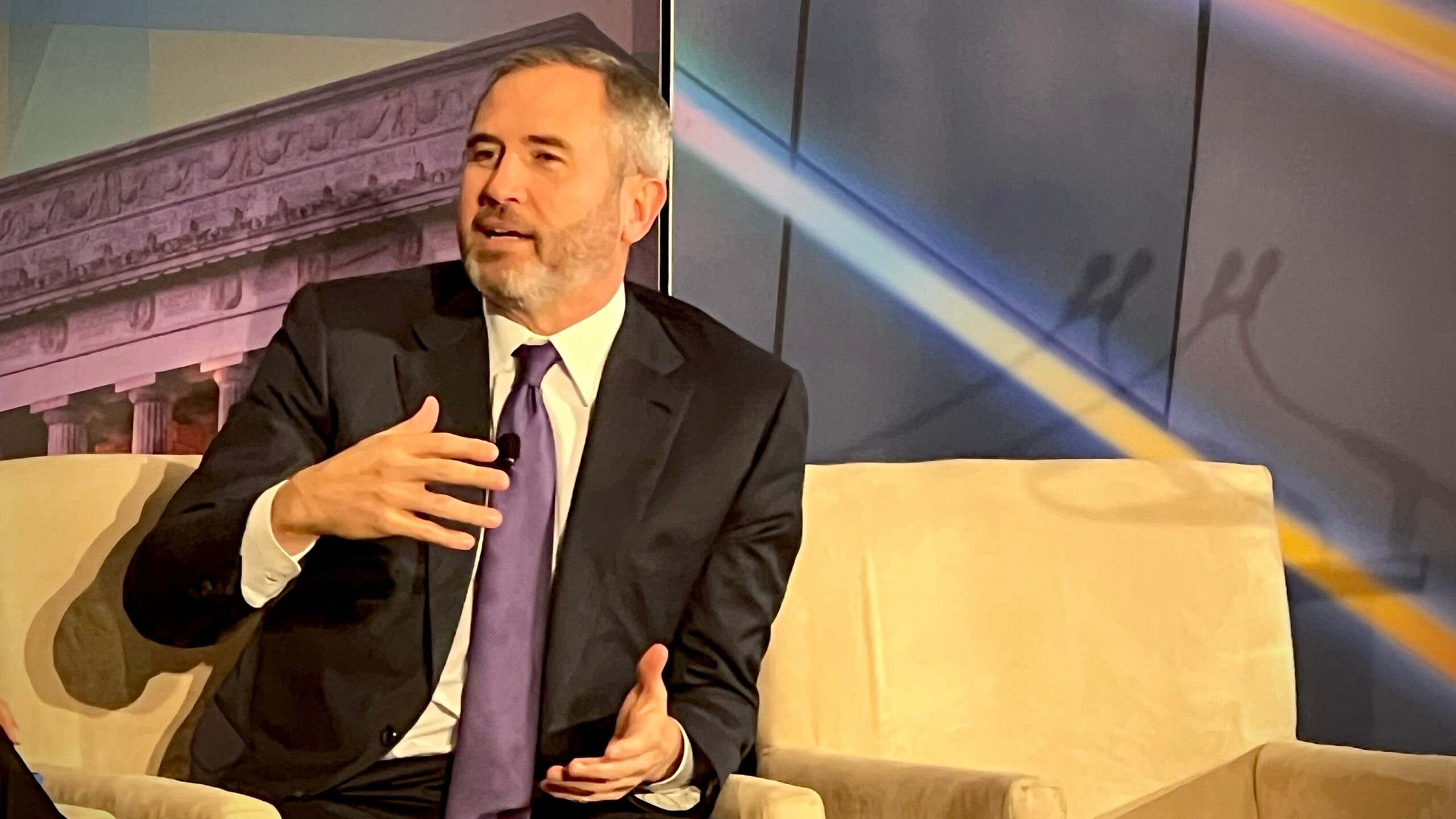A16z crypto
Ripple Drops Another $25M Into Crypto PAC to Sway 2026 Congressional Races
Published
5 months agoon
By
admin
Ripple Labs has kicked in another $25 million to the cryptocurrency industry’s Fairshake political action committee, one of the most aggressive and high-dollar campaign-finance operations in corporate history.
The super PAC has made an unprecedented head start on the 2026 election cycle. Between Ripple, crypto exchange Coinbase (COIN) and venture capital firm Andreessen Horowitz (a16z), Fairshake has amassed $73 million in fresh commitments. That’s on top of $30 million held over from the 2024 cycle.
The PAC is still awaiting the results in one U.S. congressional contest in the Nov. 5 elections, but Fairshake’s track record includes backing at least 53 members of next year’s Congress.
“Fairshake is the most successful multi-candidate, bipartisan super PAC in American history,” Ripple CEO Brad Garlinghouse posted Tuesday on X (formerly Twitter). “Electing pro-crypto, pro-growth and pro-innovation candidates is a no-brainer, and to continue that momentum, Ripple is contributing another $25M to Fairshake.”
The $103 million war chest makes Fairshake an unmatched political force to influence the session beginning in 2027, more than two years and a whole congressional cycle from now.
Ripple, Coinbase and a16z made up the vast bulk of resources Fairshake devoted to congressional races in an attempt to ensure pro-digital assets candidates would pass legislation during the session beginning in January. The industry has waited for years for the U.S. government to clarify its rules for this sector, and the resulting uncertainty has left a lot of potential business on the sidelines.
None of the three companies will comment on how decisions are made in the operation of Fairshake, nor how they guide the super PAC’s strategy. But Fairshake’s spokesman, Josh Vlasto, has said the political strategy is a transparent support of crypto advocates from either party who are willing to work across the aisle on legislation.
Each of the three companies has now participated in three rounds of funding for the PAC, each at approximately the same level. The other two had already jumped into the post-election support, and Ripple is now joining them, bringing the company’s overall support to about $73 million.
Source link
You may like


Apple Delists 14 Crypto Apps in South Korea Including KuCoin and MEXC Exchanges Amid Regulatory Crackdown


Athens Exchange Group eyes first onchain order book via Sui


Futureverse Acquires Candy Digital, Taps DC Comics and Netflix IP to Boost Metaverse Strategy


Court Grants Ripple And SEC’s Joint Motion To Suspend Appeal


AVAX Falls 2.1% as Nearly All Assets Trade Lower


What is a VTuber, and how do you become one in 2025?
a16z
Stablecoins Are ‘WhatsApp Moment’ for Money Transfers, a16z Says
Published
7 days agoon
April 10, 2025By
admin

Remember the old days when calling or sending a message via text outside the country cost money? With the help of modern messaging apps like WhatsApp, paying for cross-border calls and texts is now obsolete.
For money transfers, stablecoins might do just that: democratize the payments industry by eliminating historical gatekeepers, says venture firm Andreessen Horowitz (a16z).
“Just as WhatsApp disrupted costly international phone calls, blockchain payments and stablecoins are transforming global money transfers,” the firm said in a blog post on Wednesday.
The current global payment infrastructure is a complex web involving points of sale, payment processors, acquiring banks, issuing banks, correspondent banks, foreign exchanges, and card networks.
Read more: What Is a Stablecoin?
To make matters more difficult, each of these intermediaries charges fees and introduces delays, making international transactions cumbersome. For instance, a16z says remittance fees can reach up to 10% — just like cross-border calls or text used to be restrictive before instant messaging apps came into play.
Enter blockchain and stablecoins — cryptocurrencies pegged to assets like the U.S. dollar.
“Stablecoins offer a clean-slate alternative. Instead of stitching together clunky, costly, and outdated systems, stablecoins flow seamlessly on top of global blockchains,” the blog post said.
“Already, stablecoins are slashing the cost of remittances: Sending $200 from the U.S. to Columbia using traditional methods will cost you $12.13; with stablecoins, it costs $0.01.”
And, it’s not just remittances where stablecoins are eliminating inefficiencies; this could help boost B2B payments on a massive scale, too. A16z uses business transactions from Mexico to Vietnam as an example, which take three to seven days to process and cost anywhere between $14-to-$150 per $1000 transacted. These pass through as many as five intermediaries along the way, each of which takes a cut.
The adoption of stablecoin could make such transactions nearly free and instant, it says.
Some corporations have taken notice, and Elon Musk’s SpaceX is already using stablecoins to manage their corporate treasuries to shield itself from FX volatility.
So, it shouldn’t surprise anyone to see that the total market cap of stablecoins has passed $200 billion or that the annualized transaction value of stablecoins in 2024 hit $15.6 trillion — roughly 119% and 200% that of Visa and Mastercard, respectively.
However, the rise of stablecoins isn’t without challenges.
Regulatory bodies have scrutinized their use, making it “incredibly difficult” to bridge traditional finance to stablecoins, said a16z. The landscape is now finally evolving, as policymakers are now actively shaping rules to recognize and regulate stablecoins in the U.S. “A forthcoming bill clarifying this regulation could pave the way for even broader adoption and integration into the global financial system,” the blog said.
With the rapidly changing landscape for finance and crypto becoming more mainstream, stablecoins could become the transformative force that revolutionizes the future of money.
“Just as WhatsApp disrupted costly international phone calls, blockchain payments and stablecoins are transforming global money transfers,” added a16z.
Read more: U.S. House Committee Advances Stablecoin Bill, While Dems Warn of Trump Conflicts
Source link

Apple Delists 14 Crypto Apps in South Korea Including KuCoin and MEXC Exchanges Amid Regulatory Crackdown

Athens Exchange Group eyes first onchain order book via Sui

Futureverse Acquires Candy Digital, Taps DC Comics and Netflix IP to Boost Metaverse Strategy
Court Grants Ripple And SEC’s Joint Motion To Suspend Appeal

AVAX Falls 2.1% as Nearly All Assets Trade Lower

What is a VTuber, and how do you become one in 2025?

Top Expert’s Update Sets $10 Target

How Academia Interacts With The Bitcoin Ecosystem

AB DAO and Bitget Launch Dual Reward Campaign, Distributing $2.6M Worth of $AB Globally

AI crypto tokens at risk as Nvidia faces restrictions on China exports

Coinbase Urges Australia to Vote for Crypto Progress in May

How High Would Pi Network Price Go If Pi Coin Adopts Transparency to Avoid Mantra Pitfalls

XRP’s ‘Rising Wedge’ Breakdown Puts Focus on $1.6 Price Support

China selling seized crypto to top up coffers as economy slows: Report

Ethereum Price Dips Again—Time to Panic or Opportunity to Buy?

Arthur Hayes, Murad’s Prediction For Meme Coins, AI & DeFi Coins For 2025

Expert Sees Bitcoin Dipping To $50K While Bullish Signs Persist

Aptos Leverages Chainlink To Enhance Scalability and Data Access

Bitcoin Could Rally to $80,000 on the Eve of US Elections

Crypto’s Big Trump Gamble Is Risky

Sonic Now ‘Golden Standard’ of Layer-2s After Scaling Transactions to 16,000+ per Second, Says Andre Cronje

Institutional Investors Go All In on Crypto as 57% Plan to Boost Allocations as Bull Run Heats Up, Sygnum Survey Reveals

Ripple-SEC Case Ends, But These 3 Rivals Could Jump 500x

3 Voting Polls Show Why Ripple’s XRP Price Could Hit $10 Soon

Has The Bitcoin Price Already Peaked?

The Future of Bitcoin: Scaling, Institutional Adoption, and Strategic Reserves with Rich Rines

A16z-backed Espresso announces mainnet launch of core product

Xmas Altcoin Rally Insights by BNM Agent I

Blockchain groups challenge new broker reporting rule

I’m Grateful for Trump’s Embrace of Bitcoin
Trending

 24/7 Cryptocurrency News5 months ago
24/7 Cryptocurrency News5 months agoArthur Hayes, Murad’s Prediction For Meme Coins, AI & DeFi Coins For 2025

 Bitcoin3 months ago
Bitcoin3 months agoExpert Sees Bitcoin Dipping To $50K While Bullish Signs Persist

 24/7 Cryptocurrency News3 months ago
24/7 Cryptocurrency News3 months agoAptos Leverages Chainlink To Enhance Scalability and Data Access

 Bitcoin5 months ago
Bitcoin5 months agoBitcoin Could Rally to $80,000 on the Eve of US Elections

 Opinion5 months ago
Opinion5 months agoCrypto’s Big Trump Gamble Is Risky

 Altcoins3 months ago
Altcoins3 months agoSonic Now ‘Golden Standard’ of Layer-2s After Scaling Transactions to 16,000+ per Second, Says Andre Cronje

 Bitcoin5 months ago
Bitcoin5 months agoInstitutional Investors Go All In on Crypto as 57% Plan to Boost Allocations as Bull Run Heats Up, Sygnum Survey Reveals

 Price analysis5 months ago
Price analysis5 months agoRipple-SEC Case Ends, But These 3 Rivals Could Jump 500x


